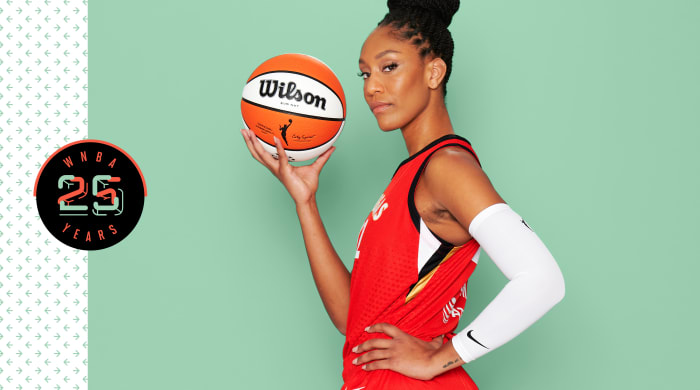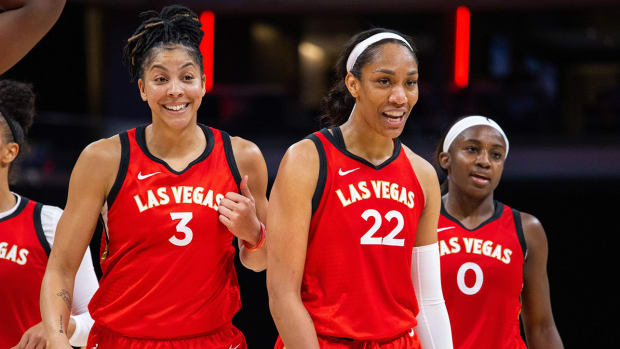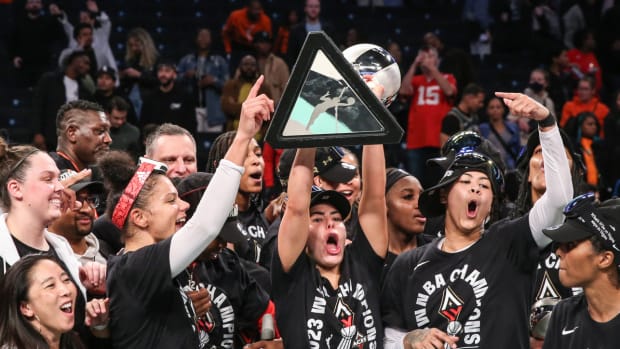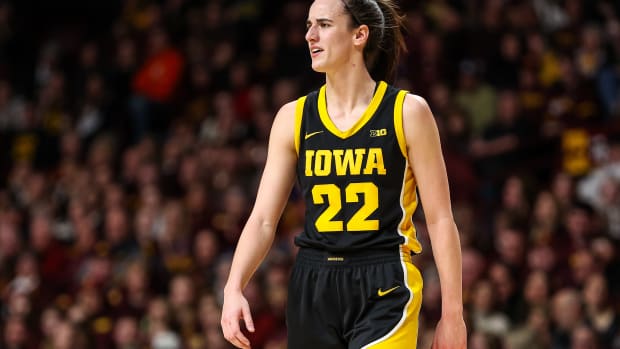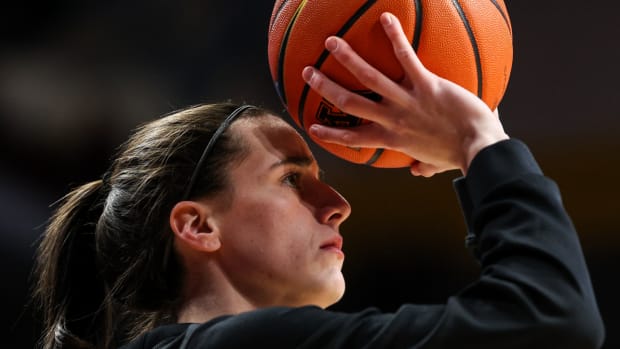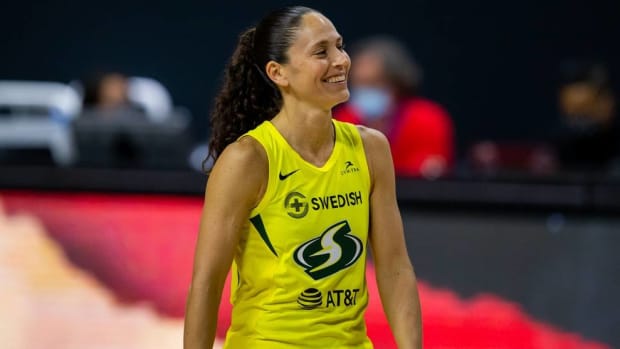A’ja Wilson Has Been Through the Wringer
It was Aug. 8, 2008, the opening day of the Summer Olympic Games in Beijing. A’ja Wilson was celebrating her 12th birthday with an Olympic-themed party to watch the U.S. women’s basketball team play. That legendary squad included the likes of Seimone Augustus, Sue Bird, Tamika Catchings, Sylvia Fowles, Lisa Leslie, Candace Parker and Diana Taurasi.
“This was my first time seeing WNBA players, and I did not understand how much it really meant to watch women play the game so well and make it look easy,” says Wilson. “I remember saying, ‘These women are badass. They are going after it. That’s how I want to be.’ ”
The team—with a combined 26 WNBA championships and 82 All-Star selections—went on to win its fourth straight Olympic gold medal. The Games sparked Wilson to want to play basketball professionally.
But Wilson, 24, in her fourth WNBA season with the Aces—a title favorite—never really thought she would walk in the shoes of those who came before her. Wilson, both before and after becoming one of the youngest MVPs in WNBA history and earning All-WNBA first team and All-Defensive second team honors last season, was put through the wringer. Improving her game early on, self-doubt, a fear of failure and redefining her purpose all made Wilson who she is now.
Growing up in Hopkins, S.C., Wilson’s first test of toughness came from her dad, Roscoe, who played basketball at Benedict College and professionally for 10 years in Europe. He coached A’ja, a tall player with extremely long arms who could shoot three-pointers, to build up her overall game.
“A’ja was sorry when she first started playing,” Roscoe says. “She didn’t like a lot of post moves. We had to work on getting to the basket, hitting the 12-foot, 15-foot, 8-foot jumpers. I would scream at her and tell her, ‘You are going to get this done,’ and that her college coach would be tougher on her than I am.”
A’ja wanted to be a normal teen some days and hang out with her friends. Roscoe disagreed.
“He would say absolutely not and tell me to go work on my game and that I am not normal,” Wilson says. “There were days I would come home and tell my mom, it’s either me or him, pick one. I did not know how to separate coach from Dad.”
As Wilson began to understand the game more and—as Roscoe put it—stopped fighting the training, she grew. She set goals for what she wanted to accomplish.
“She is a write-it-down-and-check-it-off person,” says Eva, her mother. “She does everything purpose-driven.”
A’ja’s internal drive and her hours in the gym with Roscoe helped her reach goals of being the 2014 Naismith and WBCA High School Player of the Year, the ’14 USA Today and Gatorade High School South Carolina Girls Basketball Player of the Year and a ’14 McDonald’s All-American. She also won a state championship at Heathwood Hall High School that year.
“I knew A’ja was going to be good, not because of her performance but because of her work ethic,” Roscoe says.
Dawn Staley, who coached Wilson at South Carolina, adds: “I saw A’ja very early on in her basketball career when she came to camps at South Carolina, and she could not play,” she says. “To see what she accomplished from seventh grade to being the top high school player coming into South Carolina, you get a pretty good feel of the dedication to her craft.”
Reaching new levels brings new adjustments. Wilson was in for a surprise when Staley decided to have the talented forward come off the bench at South Carolina as a freshman.
It was the best thing that could have happened to her. A’ja finished her season as SEC Freshman of the Year and earned first team All-SEC honors in 2015, averaging 13.1 points and 6.6 rebounds in 19.8 minutes per game. The following season, Wilson earned the first of her three SEC Player of the Year awards, the only person to accomplish that achievement.
She helped South Carolina win three SEC regular-season titles, four SEC tournament championships and its first national championship, in 2017. She also finished her career as a three-time WBCA All-American first team, three-time Associated Press All-American first team, a USBWA All-American, a consensus National Player of the Year in ’18 and the Gamecocks’ all-time leading scorer.
“As a mother and as a Black mother, I always wanted A’ja to be coached by a Black female in college,” Eva says. “To have A’ja go to play at South Carolina under Dawn Staley was divine intervention.”
“Coach Staley is my second mom,” Wilson adds.
Staley’s impact went beyond the court for Wilson. When Wilson told Staley that she was diagnosed with dyslexia, it was Staley who made her process that feeling and deal with it.
“She made me read a scripture before every shootaround, before every game, because she wanted me to feel comfortable enough to do it,” Wilson says. “She dug deep into who I was and who she wanted me to be.”
Thanks to Staley, and with the help of her parents, Wilson started the A’ja Wilson Foundation in 2019 to serve as a resource for children and their families who struggle with dyslexia and empower them to reach their full potential through educational programming, workshops, camps and grant opportunities.
As Wilson’s college career came to an end, she reminded her mom of three goals she set during her days in high school: win a state championship, a national championship and a gold medal as the youngest member of the U.S. national team in the 2018 FIBA World Cup. She did all three.
Since being drafted No. 1 by the Aces in 2018, winning a WNBA championship has been the ultimate goal.
Despite her collegiate success, Wilson was nervous for the next chapter. After the franchise spent six seasons as the Utah Starzz and then 15 seasons in San Antonio as the Silver Stars and the Stars, there was a new beginning in 2018 with the relocation to Las Vegas as the Aces. Wilson was a key piece.
“If you would have asked me when I was 16 would I play in the WNBA, I probably would have laughed in your face and said no way I am playing at that level,” Wilson says. “I was a young gun coming into this new world in Las Vegas, new team, new everything. We did not have histories or legacies or a standard to match. We were writing our own book.”
In her 2018 rookie season, she averaged 20.7 points, 8.0 rebounds and 2.2 assists per game; won Rookie of the Year; was voted into the All-Star Game; and was tied for third in the league in scoring. But the Aces missed the playoffs that season, finishing in ninth place with a 14–20 record.
In Year 2, after suffering an ankle injury that sidelined her for four weeks, Wilson returned and averaged 16.5 points and 6.4 rebounds per game. The Aces earned the fourth seed in the playoffs and knocked off the Sky in a second-round elimination game before losing to the Mystics in four games in the semifinals.
The injury and the addition of center Liz Cambage represented the start to her growth as a WNBA player.
“I was not the only superstar. It was not just me and with all of the peer pressure and the hype of people saying we were going to win it all,” Wilson says. “I had to learn how to get everybody involved, especially when we didn’t meet expectations. I probably would not have realized these things if we had not gained Liz. I really had to look at myself and say I had to do better.”
It was in Year 3, in the middle of the coronavirus pandemic, playing in the Wubble at the IMG Academy in Bradenton, Fla., that Wilson took her game to new heights. When Cambage opted out due to health concerns surrounding the pandemic and guard Kelsey Plum tore her left Achilles tendon, Wilson picked up the slack, averaging 20.5 points, 8.5 rebounds, 2.0 assists and a league-best 2.0 blocks per game as the Aces finished 18–4. They earned the No. 1 seed and an appearance in the WNBA Finals for the second time in franchise history, when most counted the Aces out.
“I would sit in the Wubble and listen to sports shows talk about teams, and they did not mention the Aces and it would get me fired up,” Wilson says. “It was also a gut check for us.”
When the Storm put up dominant performances in the Finals and swept the Aces in three games, Wilson felt like she had failed her teammates and herself.
“No one expected us to make it that far, but to see us come together for one common goal and that feeling of getting swept was hard. Like, we could not win one game,” Wilson says. “I had to take some time off. I won MVP, but I don’t want my teammates to ever have that feeling again that we felt in the locker room in the bubble after the Finals.”
Away from the court, Wilson was struggling while attempting to be the rock for the young and banged-up Aces. In an article for The Players’ Tribune in March, Wilson spoke out about her anxiety, panic attacks and thoughts of failure, along with the importance of loving herself more while playing in the Wubble.
“I felt things that I never felt before,” Wilson says. “You know when you are an athlete, nothing is supposed to be wrong. Everything is supposed to be easy and life is good.
“Failure and doubt would creep in my mind. I did not have my family to go to. I did not have my puppies. Being in the Wubble forced me to get out of my comfort zone, forced me to figure out my priorities and ultimately helped me define who I am, what I wanted to do and define my purpose going forward.”
With a newly found purpose and a chip on her shoulder after last season’s sweep in the Finals, Wilson has gotten back to her happy place, one that includes a balance of elite-level basketball and enjoying time with her close-knit group of friends and family—a space where she gets to be “A’ja” and not the Aces star forward and league MVP.
“When she comes home, we don’t treat her like the MVP. She leaves that at the door and she’s regular old A’ja,” Roscoe says. “We sit on the couch and watch movies and if we aren’t doing that, we’re playing some variation of Uno, watching her perform songs on her rose-gold karaoke microphone to witnessing her two juvenile offender dogs act like humans.”
Performing karaoke comes easy for her.
“I am sick on the microphone,” Wilson says. “Whatever you want, I can sing it, Auto-Tune or no Auto-Tune. My stage presence is perfect. American Idol should bring me on.
“If Beyoncé ever wants to perform a duet with me, I would be open to it, and, when it comes to New Edition, I am every single part. Mary J. Blige and 2000s R&B, I love it.”
And when she is not playing Uno or performing karaoke with her family, Wilson is probably eating some snacks. Wings guard Allisha Gray, Wilson’s teammate at South Carolina during the championship season, says that not only does Wilson love snacks, she would steal hers as well.
“She be taking all of my snacks. She’s a snack thief,” Gray says, laughing. “I remember being in camp and having a brand-new bag of chips, and here comes A’ja saying, ‘Are you going to eat those chips?’ ”
Wilson gets three full-course meals a day but does not shy away from her love for eating popcorn, a honey bun or good bag of chips.
“When Allisha and I were roommates, I would tell her what’s yours is mine but what’s mine is mine.”
Wilson’s passion and love for basketball stems from her family.
“They are the people I go after it for,” Wilson says. “They made so many sacrifices for me.”
No family member is more important to Wilson than her maternal grandmother, Hattie Rakes, who died in 2016 at 95. Rakes got the chance to see Wilson play in college one time.
“Coach Staley made arrangements to where my mother could see A’ja through the tunnel,” Eva says. “She did not really understand the concept of basketball, but she did not like when other girls pushed on A’ja.”
Rakes had several grandchildren, but she and Wilson had a special bond from birth. When Ava had a Cesarean with A’ja, the Wilsons did not bring A’ja home right away to their house because they had stairs. They went from the hospital to Rakes’s house for three weeks so she could help take care of A’ja.
While Roscoe and Eva worked throughout the day when A’ja was a baby, Rakes would keep her. While Ava was nervous about A’ja’s starting preschool at the age of three at her father-in-law’s church’s program, Rakes had it all under control.
“It was just the two of them, and the night before it was time for her to go to preschool, it’s like everything switched,” Eva says. “My mom got her ready. I believe the two of them shared secrets that we still don’t know to this day.”
Wilson, who has a tattoo of her grandmother’s name on her forearm, almost gave up on basketball when Rakes died. Instead of calling it quits, Wilson dedicated her basketball career to Rakes.
“I am surprised I am not bawling crying right now,” Wilson says. “I remember Coach Staley coming to my house like, ‘Look, girl, you cannot just dip out like this.’ I had to remember my grandmother would not want me to do that. She would tell me to lace my shoes and go out there.’ ”
When South Carolina revealed the A’ja Wilson statue outside of Colonial Life Arena in January, that honor—one that puts her in conversation with Althea Gibson, Pat Summitt, Wilma Rudolph and Brandi Chastain to be remembered in such a historic manner—was a testament, Wilson says, to her grandmother and the role model she wants to be for the next generation of young athletes.
“When people think about what I did in that arena, they think basketball and national championship,” Wilson says. “I think of my legacy off the court and hoping that young girls see me as a woman with a positive light and being active in my community.
“My grandmother could not even be on that campus and to think about that, this is a piece of her, a seed that she planted and for it to happen, this statue goes beyond the basketball accolades.”
Staley says she is not shocked by Wilson’s monumental accomplishments so soon in her career.
“She hit the ground running, and it is not surprising as she has the favor of God covering her,” Staley says. “That’s why her success doesn’t surprise me. Even with some people being a little jealous or even some hate, these things only motivate A’ja to continue to put the work to be better at her craft.”

The statue puts Wilson in conversation with greats like Althea Gibson, Pat Summitt and Wilma Rudolph.
Courtesy of South Carolina Athletics
From balancing a busy life on the court to spending time with family and friends, Wilson still finds time to hop on her podcast with Napheesa Collier—Tea With A & Phee—and launch a candle line, Burnt Wax Candle Company.
Collier brought the idea of a podcast to Wilson as the two of them wanted to start a new voice of the WNBA and share what it is like to be athletes in today’s league. They brought on guests like the Portland Trail Blazers’ Damian Lillard; the Brooklyn Nets’ Kevin Durant; and rapper, singer and songwriter Saweetie.
Away from the court in her own space with her two dogs, A’ja also enjoys her love for candles. With a little push from her mother, she started the company but had no idea she would sell out in her first order.
“I had my Christmas money and was like a little kid super excited to start a business,” Wilson says, smiling. “I went out on a limb and was nervous about it because, you know, you can’t smell candles beforehand. It was a risk.”
Whether Wilson is lighting candles or lighting it up on the hardwood, she is determined to make an impact on those around her each day.
As teams start their respective seasons that will not include a Wubble in 2021, Wilson and other players have not forgotten about the impact they made away from the court in the fight for social justice.
The league helped take down then Dream co-owner and U.S. Sen. Kelly Loeffler (R., Ga.) after she introduced a bill to ban trans girls and women from playing publicly funded sports and her clashing with players over their support for Black Lives Matter and Say Her Name, a campaign spotlighting Black women killed by police.
“Black Lives Matter is not a trend. This is my life,” Wilson says. “This could be me, my brother, my dad, any of us. I am not one of those people where it must hit home before something has to be done.
“I am still going to be a voice for the voiceless, especially the Black woman, because she is constantly swept under the rug and overlooked.”
“I am proud that A’ja is comfortable in her own skin and being able to say the unpopular yet right things when it comes to social justice,” Staley adds. “She is not afraid for it to take away from her brand. She is authentic and she is who she is.”
While the battle off the court in society for justice and racial equality continues, Wilson is excited to be back on the hardwood.
With Plum and Cambage back along with Wilson coming off an MVP season, the Aces are a heavy favorite to make another WNBA Finals appearance.
However, coach Bill Laimbeer has stressed the idea that his team returns only four players from last season. And with Angel McCoughtry out for the season after tearing her ACL and meniscus in her right knee, his players—especially Wilson—will need to be locked in.
“When you get to the Finals, there is an expectation that you are going to do it again, but in reality it is very hard,” Laimbeer says. “We have more work to do and we have more talent on the team than we did last year.”
Plum says Wilson is a true testament to consistency.
“The way she shows up every day, you know what you are going to get from her,” Plum says. “Consistency in this league is what makes things great and that’s why she is great.”
As for Wilson, she is ready to continue her journey of following those who came before her in the 2008 Olympics but also leading the way into the next wave of future WNBA athletes.
“We as women are elite at what we do and putting the ball through the hoop,” Wilson says. “As we continue to grow, we will continue to shake the table and earn the respect that we deserve.”
More WNBA:
• The 25 Greatest Moments in WNBA History
• Inside the Liberty's Journey Back to Relevance
• How No. 1 Picks Realized a Career in the WNBA Was Possible












